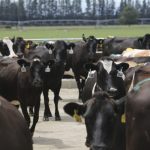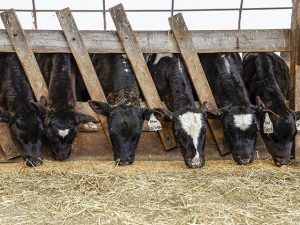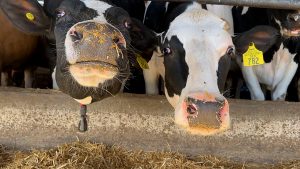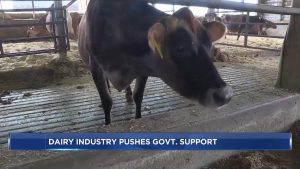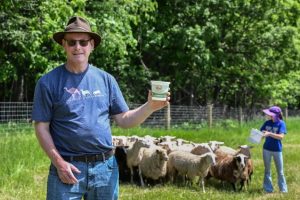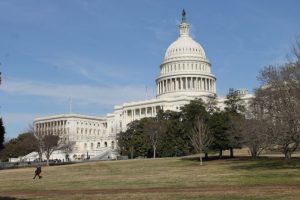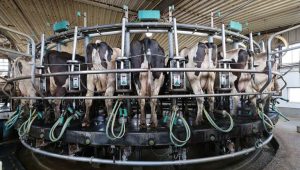
Several years ago, Jeff Corle received a phone call from a hospital. It was a woman from their HR department. She asked if he could speak to their staff on Mental Health Awareness Day.
Jeff politely informed her that she must have had the wrong person because he wasn’t a speaker and his work “didn’t have anything to do with mental heath.” As mentioned in a 2023 column, selling his cows hit Jeff hard but eventually drove him to write the country song “Empty Barn.” It became an internet hit and led to him touring across the country, as well as recording the album Farm Animal. Still, Jeff didn’t believe himself to be a public speaker, much less one who could address such a large topic.
The HR employee laughed. “Your story has everything to do with mental health,” she said, asking if he would share what he went through.
Jeff had always enjoyed performing music in front of people, but it was another matter standing in front of a crowd intently listening to his every word. His throat went dry and he did his best not to sound nervous, keeping his guitar strapped on him like a security blanket. However, he told those in attendance what it meant to have to stop farming and the despair he felt for a long time afterward. He described dealing with a sense of hopelessness and how it affected what he thought of himself, and then how he eventually found some relief by sharing his feelings in the form of a song. At the end of his talk, Jeff performed “Empty Barn” for the hospital, bringing a tear to the eyes of a few people.
When Jeff was done speaking, the president of the hospital came up to shake his hand, saying over and over again how meaningful it was to hear Jeff’s story.
The discourse around mental health in agriculture has started naming it a crisis. The National Rural Health Association reports that farmers in the U.S. are 3.5 times more likely to die by suicide than the general population. The reasons are not hard to imagine. Farmers experience more stressors than the average person, including high levels of financial risk, tight margins, reliance on markets they have no control over, unpredictable weather and many other challenges. Perhaps even more significantly, because the act of farming is so closely tied to the identity of those who do it, when a farm is threatened, so is an individual’s selfhood. Farming feels like the whole of who they are, and it’s difficult to imagine having to live without it.
Despite the numerous sources of anxiety that can affect those in agriculture, farmers tend to be reluctant to ask for help. While there is still sometimes an unfortunate stigma around addressing mental health issues, farmers are also conditioned to be independent. Most things on the farm they have to fix themselves, and therefore it may not be in their nature to seek assistance. Moreover, a study by Dublin City University has found another obstacle: the lack of cultural literacy when it comes to farming. Farmers may find some mental health service providers unsuitable because the people they’re talking to don’t know farming and the specific challenges it brings.
In addition to music, Jeff now tours the country speaking about mental health, including last year at the National Farmers Organization annual meeting.
“Guys that look like me – big guy, big beard, never without a hat on – usually are not the first people to raise their hands and say ‘Excuse me, I’d like to tell you how I’m feeling.’ Farmers, especially, are taught to fight against vulnerability,” he said. “However, when it comes to mental health, that’s the opposite of what you should be doing.”
He emphasizes that everyone, especially rural men, need to be better at talking to other people about what they’re experiencing. He explains to whatever crowd he’s in front of that while writing “Empty Barn” was a good outlet for his grief, it wasn’t until he shared it with people – and allowed others the opportunity to offer their support – that he was able to start healing from the trauma of selling his cows.
“If you tell someone what you’re feeling or going through, they can help you. Who knew?” he said, laughing.
The study from Dublin City University also found that farmers seeking help wanted real-life stories from other farmers. It was useful for them to hear from those who could understand the specific details of what they were going through. That’s likely why Jeff’s work as a public speaker has found a strong reception. The U.S. lost half of its dairy farms in the first two decades of the 21st century, leaving a lot of people who had to sell their cows just like Jeff. It’s also why the agricultural community, in the U.S. and elsewhere, should encourage each other to share what they’re feeling. In this case, being independent isn’t doing anybody any good.
Sometimes, it’s difficult to know where to start looking for help. In addition to the people around you, the following services are available free of charge.
- AgriStress HelpLine: 1-833-897-2474 (available 24/7)
- Farm Aid’s Farmer Hotline: 1-800-FARM-AID (1-800-327-6243)
- Rural Response Hotline: 1-800-464-0258
- Suicide & Crisis Lifeline: Dial 988
- A list of other resources is also offered by Penn State.
Finally, more information about Jeff’s work can be found on his website, or those who would like him to speak to a group can reach him directly by email.
You can now read the most important #news on #eDairyNews #Whatsapp channels!!!
🇺🇸 eDairy News INGLÊS: https://whatsapp.com/channel/0029VaKsjzGDTkJyIN6hcP1K


